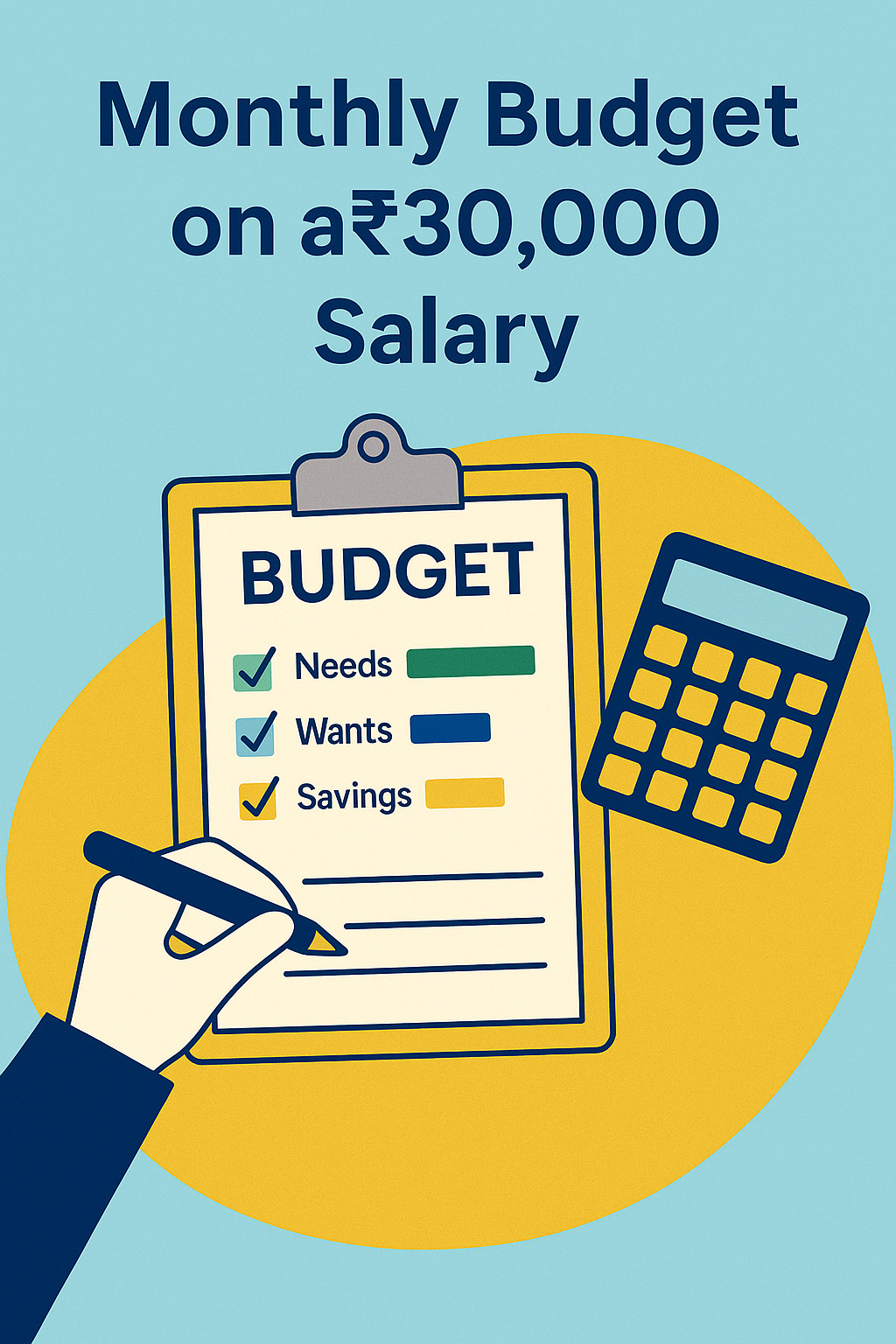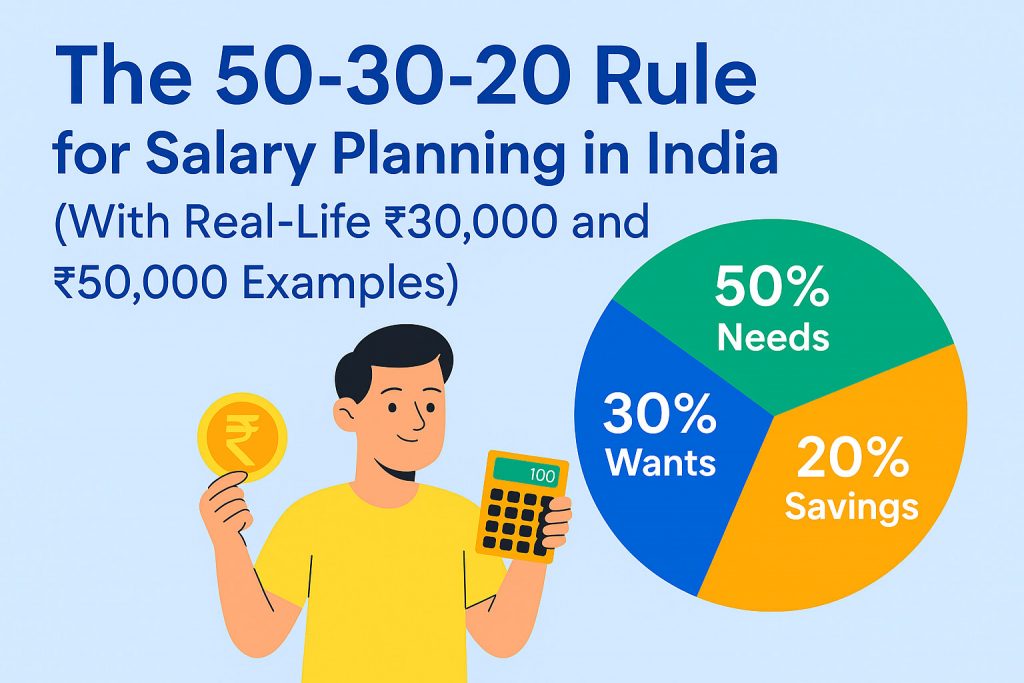“I’ll worry about retirement later…” Famous last words of 90% of Indian professionals who end up depending on children or EPF savings. The shocking truth? ₹1 crore today will be worth just ₹23 lakhs after 30 years due to 7% inflation. But here’s the good news – with systematic planning, even a 25-year-old earning ₹30,000/month can create this corpus. Let me show you exactly how.
Why Retirement Planning Feels Scary for Salaried Indians 🎯
Let’s face it —
In your 20s and 30s, thinking about retirement feels weird.
Today you’re:
-
Saving for your first house.
-
Paying EMIs.
-
Planning trips, weddings, upgrading gadgets.
Retirement? Feels light-years away.
But time moves fast, and inflation doesn’t wait.
The cost of healthcare, daily expenses, and even simple comforts will double, triple, quadruple by the time you hit 60.
A loaf of bread costing ₹40 today could cost ₹120 by then. 🥖
👉 Building ₹1 crore is NOT a luxury anymore — it’s basic survival planning.
Real-World Example: SIP Magic to Build ₹1 Crore 💬
Meet Rohit, 27 years old, IT professional.
His Goals:
-
Retire stress-free.
-
Travel twice a year after 60.
-
Financially help his parents in their 70s.
Rohit’s Plan:
-
Start a SIP of ₹3,000/month now.
-
Step up SIP by 10% every year (as salary grows).
Result:
At 12% annual returns, Rohit will comfortably build ₹1 crore (and more) by age 60.
✅ Without heavy sacrifices.
✅ Without feeling deprived in his 30s.
Step-by-Step Plan to Build ₹1 Crore Retirement Fund India 🏆
1. Start as Early as Possible 📈
Example:
If you start investing ₹2,000/month at age 22, you’ll accumulate ₹1 crore with ease.
If you delay to age 35, you’ll need ₹5,800/month.
Lesson:
Time > Amount.
Even ₹500/month started TODAY beats ₹5,000 started 10 years later.
2. Choose High-Growth Investment Vehicles 📊
Cash in a savings account grows at 3%–4% annually.
FDs give 6%–7% before tax.
✅ But inflation eats 6%–7% every year.
That’s why you must invest in:
-
Equity Mutual Funds (especially diversified, flexi-cap funds)
-
Index Funds (like Nifty 50 Index Fund)
-
PPF (Public Provident Fund) for safe, tax-free growth (good as a secondary pillar)
-
NPS (National Pension Scheme) — especially if you want dual benefits (wealth building + tax savings)
👉 Equity gives volatility short-term but outperforms all assets long-term.
3. Stay Consistent Through Market Highs and Lows 🚀
Markets crash.
Markets rally.
Markets move sideways.
But wealth gets built by those who continue investing no matter what.
Imagine:
-
2008 crash ➡️ SIP investors who continued are millionaires today.
-
2020 COVID crash ➡️ SIP investors doubled money by 2022.
SIP = “Systematic Investment Plan”
SIP ≠ “Stop Investment Plan” 😉
Consistency wins the retirement game.
4. Boost Your Contributions Gradually With Salary Growth 📈
Simple hack:
-
Every appraisal season, increase SIP by at least 10%.
Example:
-
Salary hike ₹5,000 → Boost SIP by ₹500 to ₹1,000.
✅ This keeps investments ahead of inflation.
✅ It builds a much bigger retirement fund without pain.
Pro Tip:
Use “SIP Step-Up” feature offered by Groww, Zerodha Coin, and Paytm Money.
5. Beating Inflation Is Non-Negotiable 🛡️
Inflation is the invisible enemy.
₹1 crore sounds good today…
but 30 years from now, it might buy what ₹30–40 lakh buys today.
👉 That’s why you must:
-
Invest in equity for growth.
-
Build more than ₹1 crore if possible.
-
Not stop investing mid-way.
Sample SIP Table: How Much You Need to Invest Monthly 🧮
| Starting Age | Monthly SIP Needed | Investment Duration | Approx Corpus at 60 |
|---|---|---|---|
| 22 | ₹1,500 | 38 years | ₹1 crore |
| 25 | ₹2,100 | 35 years | ₹1 crore |
| 28 | ₹2,900 | 32 years | ₹1 crore |
| 30 | ₹3,400 | 30 years | ₹1 crore |
| 32 | ₹4,200 | 28 years | ₹1 crore |
| 35 | ₹5,800 | 25 years | ₹1 crore |
✅ Earlier = smaller SIP, easier wealth.
6. Diversify but Keep It Simple 🎯
Don’t chase 10 different mutual funds.
1–2 equity funds + 1 index fund + PPF is enough for most people.
✅ Keep portfolio manageable.
✅ Review once a year.
Example simple retirement portfolio:
-
60% in Flexi-cap Mutual Fund
-
30% in Nifty 50 Index Fund
-
10% in PPF/NPS
7. Avoid Emotional Investment Mistakes 😨
Common mistakes:
-
Pausing SIPs during a crash (“Market is bad!”)
-
Switching funds based on friend’s advice
-
Over-trading or trying to time the market
👉 SIP = boring = successful.
Ignore noise. Focus on compounding.
Bonus: ₹1 Crore Mindset Shifts 🧠
To build real wealth, change how you think about money:
-
📚 Invest in learning: Read personal finance books.
-
⏳ Play long-term: 20–30 years mindset.
-
🚀 Focus on “Return on Consistency” not just “Return on Investment.”
Frequently Asked Questions (FAQ)
1. Can I build ₹1 crore if I start investing after 35?
✅ Yes, but you’ll need higher monthly SIPs or work longer.
✅ Alternatively, boost investments aggressively in your 40s.
2. Should I put lump sums like bonuses into my retirement corpus?
✅ Absolutely!
Bonuses, incentives, tax refunds — invest them smartly instead of spending impulsively.
3. How risky are equity mutual funds?
Short-term: Volatile.
Long-term (20–30 years): Very low risk historically.
Diversify properly, stay invested, and you’ll beat FD returns easily.
4. What percentage of salary should go towards retirement saving?
Minimum 20% of net income if possible.
If you can push 25–30% by early 30s — you’re golden.
5. Should I also have EPF, PPF, or NPS?
✅ Yes, they’re good “safe” pillars.
✅ But equity must form at least 50%–70% of your retirement investment if you want real growth.
Final Word: Retirement is Closer Than You Think 🎯
Today you’re in your 20s or 30s.
You blink… and it’s your 40s.
Blink again… and it’s your 50s.
✅ Start your retirement fund now.
✅ Build ₹1 crore (or more) steadily.
✅ Give your future self the gift of freedom, not fear.
📥 Download Your Free Retirement Planning Calculator!
Want to find out exactly how much you need to invest monthly based on your age, target, and returns?
✅ [Download Our Free Retirement Calculator (Excel)]
Start today — because retirement rewards action-takers, not procrastinators. 🚀


